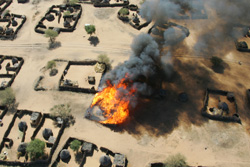
| ||||||||
| New Bishop Faces Division, Anarchy in East Africa | |||||||||
|
The United Methodist Church in East Africa is "almost in a state of anarchy" and in need of healing, according to its new bishop. That is especially true in the countries of Burundi, Kenya and Rwanda where there is division, said Bishop Daniel Wandabula of Uganda. He was elected bishop May 27 by the denomination's Africa Central Conference, which met on the Africa University campus in Mutare, Zimbabwe. He replaces the late Bishop J. Alfred Ndoricimpa, who died last July, as resident bishop for East Africa, which includes Burundi, Kenya, Rwanda, Sudan and Uganda. Before his election, Wandabula served as a pastor and former dean of superintendents and project coordinator for the Uganda/Sudan District of the denomination's East Africa Annual (regional) Conference. He worked for the people of East Africa for more than eight years and has visited all the five countries. As bishop, he says, "people expect a lot from me." The countries' situations and Ndoricimpa's death left the church "with a lot of problems," the bishop said. United Methodist bishops in neighboring countries have provided some assistance, he noted. However, the problems are significant. "The church has been almost in a state of anarchy, and there are a lot of divisions in the church, most especially in the countries of Burundi and Kenya and Rwanda," Wandabula said. Divisive issues exist among the different ethnic and tribal groups that make up the annual conference. Years of war – in Rwanda, south Sudan and northern Uganda in particular – have resulted in large numbers of orphans and in dilapidated or destroyed infrastructure. Children in Uganda are abducted and forced into slavery by rebels. In Rwanda, at least 22,000 survivors of 1994's genocide and violence are homeless, and debates are beginning as a result of an investigation into alleged irregularities in operating the fund established to assist the survivors. The crisis of Darfur, in southern Sudan, began in February 2003, when several African tribes united against the Khartoum government. The government retaliated, arming a militia that became known as the Janjaweed, which has murdered men and boys, gang-raped women and girls, and destroyed food and water supplies. More than 2.5 million people, and counting, have been displaced. United Methodists in East Africa are calling for more trained pastors and for skilled professionals to lead development projects to help communities prosper. Following Wandabula's election, Zimbabwean Bishop Eben Nhiwatiwa described East Africa as a place of challenge. "It needs a healing spirit, and we know that our brothers and sisters there will continue to show maturity and grow with their bishop." Setting priorities Wandabula outlined a tentative agenda for the church in his area. The first agenda item is to personally visit the countries or delegate teams to go into countries "where there is division and make sure that we reconcile since we preach the gospel of reconciliation." It is the church's responsibility to "bring the gospel, to bring a hope, and we believe that Jesus Christ is who can bring hope where there's no hope." "I believe that by trusting God and working as a team we'll be able to go forward and we'll be able to build a church, and we know the church will heal; we know the church will grow, not only in number but also spiritually," he added. Churches that are part of the All Africa Conference of Churches are involved in promoting healing and reconciliation in the region by engaging governments, civil society and the international community. The 2004 General Conference, the top legislative body of the United Methodist Church, instructed the United Methodist Board of Global Ministries to monitor the crisis in Darfur and to act to foster peace and humanitarian service. In February 2005, the United Methodist Committee on Relief opened operations in Darfur for humanitarian intervention and development. Operating in Khartoum and Al Daein, South Darfur, the agency is providing emergency aid and development services in water, sanitation and agriculture. Wandabula said the relief agency also began operations in Yei in southern Sudan, and the church's mission partners in the Holston Annual Conference have responded to the call to assist in bringing peace to Darfur. He said the conference will bring in resources, build schools in the Yei area, and pay pastors who have been sacrificing and working without any compensation. "We have great hope as we partner with the General Board of Global Ministries, UMCOR, the Holston Conference and other partners around the world," he said. Urging action in Sudan United Methodists are among the signers of a May 24 open letter to President Bush on Darfur, asking for specific steps to stop genocide in the Sudan. On May 5, an agreement was signed to bring peace to Darfur. Bush brokered the agreement between the Sudanese government and the largest Darfur rebel group. Although the pact has been called an important first step by the Save Darfur Coalition, the violence and genocide continue. "The starvation, torture, mutilation, and massacre of men, women and children go on. And the death toll climbs," the coalition said. The coalition has enacted "Continue America's Leadership in Darfur," an e-mail message site at http://savedarfur.org/, for people to encourage President Bush to push for a United National peacekeeping force in the country by October. A June 7 article by the Associated Press reported that the Sudanese government told a Security Council that it would not give immediate approval for a U.N. peacekeeping force in Darfur but was willing to keep talking about strengthening the presence of African Union troops. |
| ||||||||
 |





